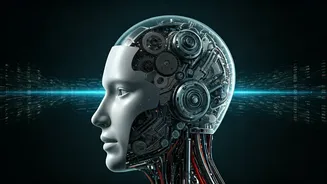AI's Intelligence, Debated
The central theme revolves around a critical inquiry: Can artificial intelligence attain the same level of intellectual prowess as humans? This question
is at the core of a discussion that engages many experts in the field. Some believe that AI’s arrival at human-level intelligence will happen soon. They think that progress in AI is rapid. These optimists foresee significant changes in various sectors, from healthcare to entertainment. Conversely, other experts express caution, pointing out the existing barriers to progress. They highlight the intricate nature of human intellect, which includes not only cognitive abilities but also aspects such as emotions, awareness, and the capacity for adaptation. This group foresees a much longer journey, or even the possibility that human-level AI may be unattainable. These discussions reveal a wide array of viewpoints, and underscore the complexity of the subject.
Defining Intelligence's Terms
The lack of agreement on what constitutes 'intelligence' further complicates the discussion. Human intelligence is a multifaceted concept that encompasses a wide range of abilities, including logical thinking, problem-solving, creative endeavors, emotional understanding, and social interactions. Assessing AI's capabilities against this benchmark is difficult, as the field itself lacks a single, widely accepted definition of intelligence. Different groups of researchers use various metrics and benchmarks to evaluate AI systems, with some focusing on specific abilities like image recognition, language processing, or game-playing skills. These diverse measures generate varied outcomes and are sometimes difficult to compare directly. The definition used greatly affects how AI's advancement is measured and assessed. This means that a lack of a clear standard makes it tough to define when AI can be called 'human-level intelligent'.
Future Hurdles for AI
Achieving human-level intelligence poses a set of significant technological hurdles. One of the main challenges lies in the creation of AI systems that can not only handle complex tasks but also learn and adapt in ways similar to humans. This includes the development of AI with general abilities rather than ones designed for very specific jobs. Current AI models often rely on vast datasets and are limited by their training data. Therefore, they may struggle in situations that require novel thinking. Creating AI that mirrors human ability to handle different situations requires improvements in areas such as natural language processing, common sense reasoning, and the ability to transfer knowledge across different areas. Many also believe that creating human-level AI would need better computer hardware, plus new algorithms and techniques to enhance AI's overall ability and flexibility. Progress in these areas is crucial to achieving human-like cognitive abilities.
Impact of Advanced AI
The implications of reaching human-level AI are wide-ranging and could bring significant changes across society. Should AI attain this level of sophistication, it could transform almost all industries, including automation, medicine, education, and many other sectors. AI-powered systems might improve medical diagnoses, assist in education with personalized instructions, or automate jobs requiring both physical and intellectual ability. However, alongside the advantages come crucial questions about ethics, security, and the future of work. There are worries about the loss of jobs, bias in AI systems, and how to manage the use of advanced AI responsibly. Addressing these concerns is crucial to making sure that AI benefits society as a whole, which also underscores the importance of thorough discussion and regulations to handle the future.














